|
|
|
Sort Order |
|
|
|
Items / Page
|
|
|
|
|
|
|
| Srl | Item |
| 1 |
ID:
187045
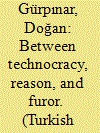

|
|
|
|
|
| Summary/Abstract |
This article aims to demonstrate the tension inherent within the Turkish opposition between those favoring technocratic anti-populism and/or pragmatic politics and those calling for a passionate and resolute anti-AKP platform seeking revenge. These competing inclinations offer alternate anti-populist platforms and ‘styles.’ The article asks whehter opposition to a populist regime inherently generates an anti-populist platform that ideologically confronts it. The article examines three contenders to President Erdoğan as representatives of three alternative anti-populist styles. It also reflects on the debates among various public intellectuals around the ways to electorally defeat populism.
|
|
|
|
|
|
|
|
|
|
|
|
|
|
|
|
| 2 |
ID:
079132
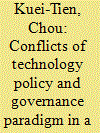

|
|
|
|
|
| Publication |
2007.
|
| Summary/Abstract |
This article discusses the technology policymaking problems associated with the establishment of the Taiwan Biobank. Taiwan, as a late-coming, technology-learning country, is characterized by a hidden and delayed risk culture. In particular, by comparing biotech and industrial policies and GMO (genetically modified organism) risk governance, we can analyze the confrontation involving the state, science experts, and society, which is the result of the authoritarian regime and expert politics that have existed in Taiwan since the Cold War era. We find that none of these factors is conducive to social trust and social support, which are essential for the establishment of a genetic database. This article argues that, in different social and historical contexts, such hidden and delayed risk cultures may have formed in different countries that value technological R&D competition.
|
|
|
|
|
|
|
|
|
|
|
|
|
|
|
|
| 3 |
ID:
092089
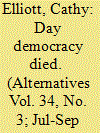

|
|
|
|
|
| Publication |
2009.
|
| Summary/Abstract |
The current fashion for good governance and promoting democracy as an integral element of development is ironically having depoliticizing effects because of its articulation with a technocratic and Westernized vision of what a good society might be like. Proceeding empirically and using texts relating to the assassination of Benazir Bhutto, this article demonstrates how discourses of democracy and development are mobilized in the contemporary international space, enabling the discursive taking of sides: for "democratic development" and against "Islamic extremism," in ways that elide other possible modes of seeing. "Democratic development" constitutes, and is constituted by, a "Western" (and British) identity in ways that are seductive, but also disciplinary: In particular, they turn out to produce and reproduce a particular set of gender relations as well as exhorting British Muslims to "fit in" with this identity. This exclusionary logic also transposes struggle over these power relations into an undemocratic international space. One key consequence of its mobilization is precisely the closing down of space for political resistance through democratic means, which I argue is not only ironically highly undemocratic, but also dangerous.
|
|
|
|
|
|
|
|
|
|
|
|
|
|
|
|
| 4 |
ID:
118550
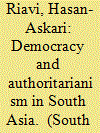

|
|
|
| 5 |
ID:
158931
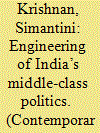

|
|
|
|
|
| Summary/Abstract |
Engineering education at the service of economic growth has long been regarded as a policy imperative for developing countries. This paper offers a theoretical analysis of how the ascendancy of engineering education, particularly in post-liberalization India, has played a role in consolidating middle-class narratives of economic liberalism and social conservatism. It shows how a focus on apolitical problem-solving in engineering disciplines can feed into hegemonic discourses on apolitical good governance and meritocracy, propagated by political parties such as the ruling BJP. This assumes significance in light of recent comparative scholarship that educated and professionally oriented middle classes in India and other developing countries, unlike their Western counterparts, tend to be socially illiberal and politically authoritarian.
|
|
|
|
|
|
|
|
|
|
|
|
|
|
|
|
| 6 |
ID:
044365
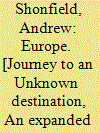

|
|
|
|
|
| Publication |
London, Allen Lane ., 1973.
|
| Description |
96p.
|
| Standard Number |
0713005263
|
|
|
|
|
|
|
|
|
|
|
|
Copies: C:1/I:0,R:0,Q:0
Circulation
| Accession# | Call# | Current Location | Status | Policy | Location |
| 013411 | 337.142/SHO 013411 | Main | On Shelf | General | |
|
|
|
|
| 7 |
ID:
157984
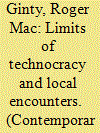

|
|
|
|
|
| Summary/Abstract |
This article is the conclusion to a special issue that examines the European Union (EU), peacebuilding, and “the local.” It argues that technocracy—particularly EU technocracy—shapes the extent to which local actors can hope to achieve ownership of externally funded and directed peace support projects and programs. Although some actors within the EU have worked hard to push localization agendas, a number of technocracy linked factors come together to limit the extent to which the EU can truly connect with the local level in its peace support activities. While the EU and other international actors have invested heavily into capacity building in conflict-affected contexts, the EU’s own capacity has not necessarily been built to address the scalar problem of accessing the local in ways that are meaningful.
|
|
|
|
|
|
|
|
|
|
|
|
|
|
|
|
| 8 |
ID:
044287
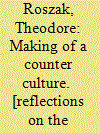

|
|
|
|
|
| Publication |
London, Faber and Faber, 1970.
|
| Description |
xiv, 303p.
|
|
|
|
|
|
|
|
|
|
|
|
Copies: C:1/I:0,R:0,Q:0
Circulation
| Accession# | Call# | Current Location | Status | Policy | Location |
| 005506 | 302/ROS 005506 | Main | On Shelf | General | |
|
|
|
|
| 9 |
ID:
142841
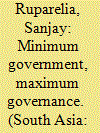

|
|
|
|
|
| Summary/Abstract |
This article examines the politics of development during the first year of the new Modi government. In particular, it explores the meaning of its guiding maxim, ‘Minimum Government, Maximum Governance’, by analysing specific reforms and broader changes in state–society relations. First, the Modi government has imposed greater discipline in public administration through a personalistic, centralised and technocratic style of rule. But it has bolstered executive power by limiting political transparency, parliamentary government and social dissent. Second, the new government has promoted urbanisation, manufacturing and infrastructure through greater economic liberalisation, public investment and institutional reform. Yet it has weakened many labour protocols, environmental regulations and participatory mechanisms regarding land acquisition and forest conservation. Lastly, the Modi administration has introduced new insurance schemes and championed digitally-enabled cash transfers to deliver social entitlements. However, it has reduced public spending on primary education and basic health, and undercut many rights-based welfare acts introduced by the previous administration, the United Progressive Alliance (UPA). These three trends have narrowed the spaces of power and contestation in contemporary Indian democracy, frustrating the promise of ‘maximum governance’.
|
|
|
|
|
|
|
|
|
|
|
|
|
|
|
|
| 10 |
ID:
166745
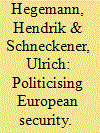

|
|
|
|
|
| Summary/Abstract |
Security provision in and by the EU has become an issue of increasing public interest and controversy. There are diverse and growing demands and critiques from different political camps towards the EU while EU institutions, in turn, utilise their security function as a resource for authority construction and self-legitimation. More recently, European security has also become intertwined with contemporary “crises” that turned it into an arena for the negotiation of fundamental conflicts, often revolving around questions of identity and sovereignty. This paper argues that these developments represent a significant change of European security and its politics that existing approaches linking the field to depoliticisation cannot adequately capture. To fill this gap, this paper suggests applying a politicisation perspective that, so far, has focused on the European integration project as such or the “Eurozone crisis” to the purportedly special security field.
|
|
|
|
|
|
|
|
|
|
|
|
|
|
|
|
| 11 |
ID:
174000
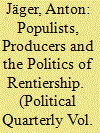

|
|
|
|
|
| Summary/Abstract |
Populism studies finds itself in a crisis of originality. While some scholars have signalled over‐usage, others have argued that by contextualising populism, we are able to specify our own ‘populist moment’ and remedy the term’s slipperiness. This article opts for the latter tactic through a comparison of two aspects of contemporary populism with late nineteenth century precedents. In the late nineteenth century, the American People’s Party pioneered a mode of mass politics anchored in agrarian and industrial labour which launched the term ‘populism’ in Western discourse. Contemporary populists show rhetorical and political overlap with this template, but also come up against two new constraints: (1) a stagnant capitalism increasingly centred on ‘rentiership’; and (2) a disorganised civil society. These factors render today’s populism resistant to analogy but also conceptually more specific, sharpening the contours of our populist moment.
|
|
|
|
|
|
|
|
|
|
|
|
|
|
|
|
| 12 |
ID:
132717


|
|
|
|
|
| Publication |
2014.
|
| Summary/Abstract |
In 2009 President Obama proposed a budget for the National Aeronautics and Space Administration (NASA) that canceled the Constellation program and included the development of commercial crew transportation systems into low Earth orbit. This significant move to shift human spaceflight into the private sector sparked political debate, but much of the discourse has focused on impacts to "safety." Although no one disputes the importance of keeping astronauts safe, strategies for defining safety reveal contrasting visions for the space program and opposing values regarding the privatization of U.S. space exploration. In other words, the debate over commercial control has largely become encoded in arguments over safety. Specifically, proponents of using commercial options for transporting astronauts to the International Space Station (ISS) argue that commercial vehicles would be safe for astronauts, while proponents of NASA control argue that commercial vehicles would be unsafe, or at least not as safe as NASA vehicles. The cost of the spaceflight program, the technical requirements for designing a vehicle, the track record of the launch vehicle, and the experience of the launch provider are all incorporated into what defines safety in human spaceflight. This paper analyzes these contested criteria through conceptual lenses provided by fields of science and technology policy (STP) and science, technology, and society (STS). We ultimately contend that these differences in definition result not merely from ambiguous understandings of safety, but from intentional and strategic choices guided by normative positions on the commercialization of human spaceflight. The debate over safety is better considered a proxy debate for the partisan preferences embedded within the dispute over public or private spaceflight.
|
|
|
|
|
|
|
|
|
|
|
|
|
|
|
|
| 13 |
ID:
041280
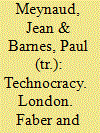

|
|
|
|
|
| Publication |
London, Faber and Faber, 1964.
|
| Description |
315p
|
| Series |
Society today and tomorrow
|
|
|
|
|
|
|
|
|
|
|
|
Copies: C:1/I:0,R:0,Q:0
Circulation
| Accession# | Call# | Current Location | Status | Policy | Location |
| 001919 | 303.483/MEY 001919 | Main | On Shelf | General | |
|
|
|
|
| 14 |
ID:
027532
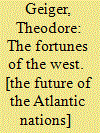

|
|
|
|
|
| Publication |
Bloomington, Indiana university press., 1973.
|
| Description |
xii,304p.
|
| Standard Number |
0253127106
|
|
|
|
|
|
|
|
|
|
|
|
Copies: C:1/I:0,R:0,Q:0
Circulation
| Accession# | Call# | Current Location | Status | Policy | Location |
| 012714 | 303.491821/GEI 012714 | Main | On Shelf | General | |
|
|
|
|
|
|
|
|
|